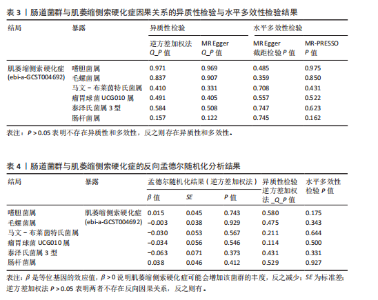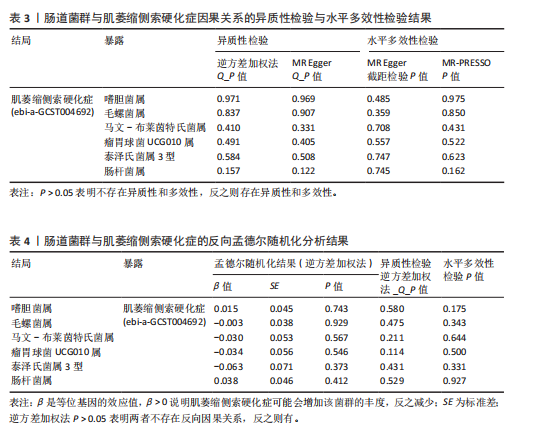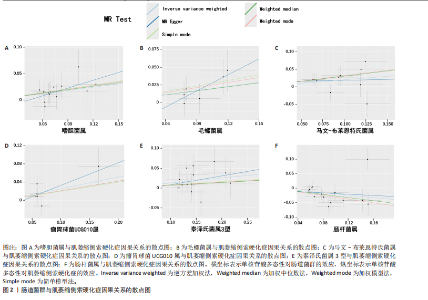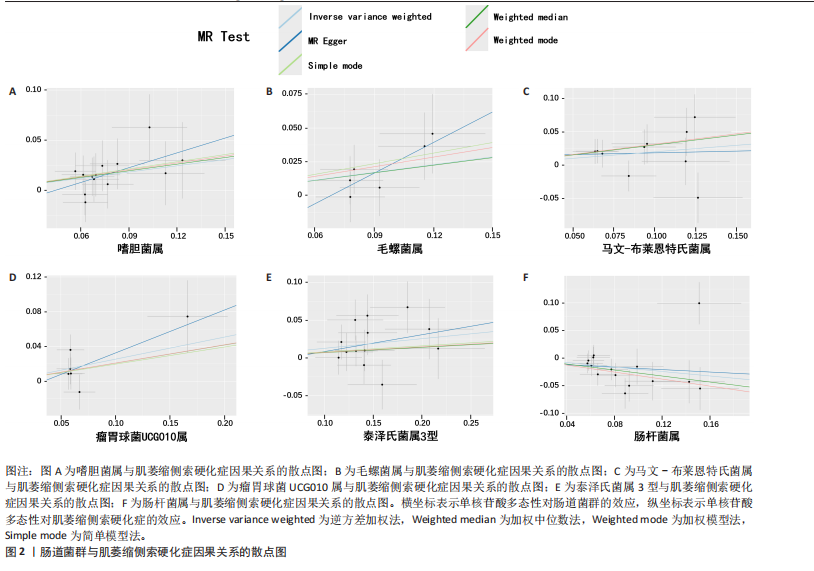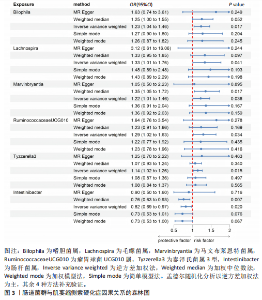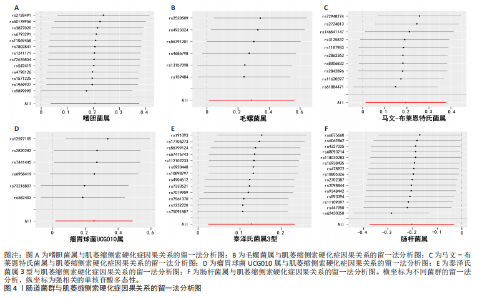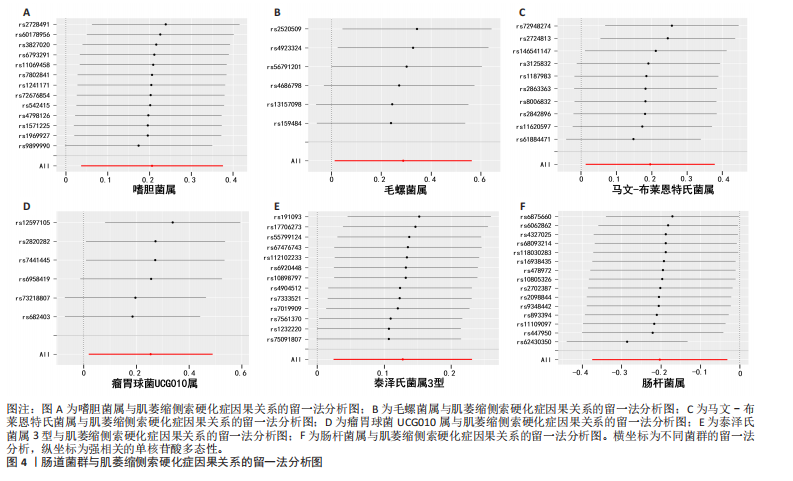Chinese Journal of Tissue Engineering Research ›› 2026, Vol. 30 ›› Issue (12): 3182-3189.doi: 10.12307/2026.686
Previous Articles Next Articles
Causal relationship between gut microbiota and amyotrophic lateral sclerosis: sample analysis from the IEU Open GWAS Database
Wang Tao1, Min Youjiang2, Wang Min3, Wang Shunpu3, Li Le1, Zhang Chen1, Xiao Weiping3, Yu Yiping3
- 1Jiangxi University of Chinese Medicine, Nanchang 330004, Jiangxi Province, China; 2Nanchang Medical College, Nanchang 330052, Jiangxi Province, China; 3The Affiliated Hospital of Jiangxi University of Chinese Medicine, Nanchang 330006, Jiangxi Province, China
-
Received:2025-06-06Accepted:2025-08-13Online:2026-04-28Published:2025-10-09 -
Contact:Xiao Weiping, Chief physician, Doctoral supervisor, The Affiliated Hospital of Jiangxi University of Chinese Medicine, Nanchang 330006, Jiangxi Province, China Corresponding author: Yu Yiping, Associate chief technician, The Affiliated Hospital of Jiangxi University of Chinese Medicine, Nanchang 330006, Jiangxi Province, China -
About author:Wang Tao, PhD candidate, Jiangxi University of Chinese Medicine, Nanchang 330004, Jiangxi Province, China -
Supported by:The National Natural Science Foundation of China, No. 82260963 (to MYJ); Natural Science Foundation Key Project of Jiangxi Province, No. 20242BAB26165 (to MYJ); National Project for the Construction of Inheritance Studios for Distinguished Traditional Chinese Medicine Experts, No. [2024] 39 (to XWP); Jiangxi Provincial Department of Education Scientific Research Project, No. GJJ201245 (to XWP)
CLC Number:
Cite this article
Wang Tao, Min Youjiang, Wang Min, Wang Shunpu, Li Le, Zhang Chen, Xiao Weiping, Yu Yiping. Causal relationship between gut microbiota and amyotrophic lateral sclerosis: sample analysis from the IEU Open GWAS Database[J]. Chinese Journal of Tissue Engineering Research, 2026, 30(12): 3182-3189.
share this article
Add to citation manager EndNote|Reference Manager|ProCite|BibTeX|RefWorks
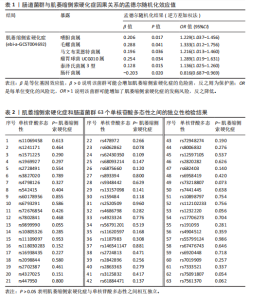
2.1 正向孟德尔随机化分析结果 此次研究主要采用逆方差加权法进行孟德尔随机化分析,最终识别出6种与肌萎缩侧索硬化症显著相关的肠道菌属,共纳入63个单核苷酸多态性。其中,嗜胆菌属、毛螺菌属、马文-布莱恩特氏菌属、瘤胃球菌UCG010属和泰泽氏菌属3型(β均> 0、OR均> 1且P < 0.05)是肌萎缩侧索硬化症的危险菌;肠杆菌属(β < 0、OR < 1且P < 0.05)是肌萎缩侧索硬化症的保护菌;此外,运用MR-Egger等4种方法对结果进行验证,所得结论与逆方差加权法一致,增强了结果的稳健性,见图2,3和表1。肌萎缩侧索硬化症和肠道菌群的63个单核苷酸多态性之间的独立性检验结果,见表2。 2.2 敏感性分析结果 在敏感性分析中,Cochran’s Q检验、MR-PRESSO全局检验和MR-Egger截距检验结果显示所有纳入的菌类P均> 0.05,表明肠道菌群的工具变量不存在异质性和水平多效性,见表3。留一法分析结果显示,在逐一排除单个单核苷酸多态性后结果没有发生变化,无异常离散点,见图4,进一步验证了研究结果的可靠性和稳健性。 2.3 反向孟德尔随机化分析结果 将肌萎缩侧索硬化症作为暴露因素,正向分析得到的菌群为结局变量进行分析,反向孟德尔随机化分析结果显示P均> 0.05,说明肌萎缩侧索硬化症与筛选得到的菌群无反向因果关系,见表4。"
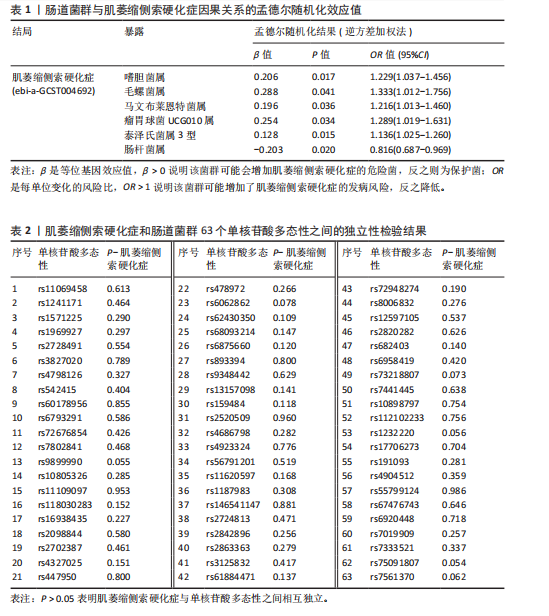
| [1] NGUYEN L. Updates on Disease Mechanisms and Therapeutics for Amyotrophic Lateral Sclerosis. Cells. 2024;13(11):888. [2] MEJZINI R, FLYNN LL, PITOUT IL, et al. ALS Genetics, Mechanisms, and Therapeutics: Where Are We Now? Front Neurosci. 2019; 13:1310. [3] RIZEA RE, CORLATESCU AD, COSTIN HP, et al. Understanding Amyotrophic Lateral Sclerosis: Pathophysiology, Diagnosis, and Therapeutic Advances. Int J Mol Sci. 2024; 25(18):9966. [4] FONTANA A, MARIN B, LUNA J, et al. Time-trend evolution and determinants of sex ratio in Amyotrophic Lateral Sclerosis: a dose-response meta-analysis. J Neurol. 2021;268(8):2973-2984. [5] RIVA N, DOMI T, POZZI L, et al. Update on recent advances in amyotrophic lateral sclerosis. J Neurol. 2024;271(7):4693-4723. [6] KIERNAN MC, KAJI R. Emerging concepts and therapies for amyotrophic lateral sclerosis. Curr Opin Neurol. 2024;37(5): 558-559. [7] FABI JP. The connection between gut microbiota and its metabolites with neurodegenerative diseases in humans. Metab Brain Dis. 2024;39(5):967-984. [8] NAKHAL MM, YASSIN LK, ALYAQOUBI R, et al. The Microbiota-Gut-Brain Axis and Neurological Disorders: A Comprehensive Review. Life (Basel). 2024;14(10):1234. [9] LIU X, LIU Y, LIU J, et al. Correlation between the gut microbiome and neurodegenerative diseases: a review of metagenomics evidence. Neural Regen Res. 2024;19(4):833-845. [10] KAUL M, MUKHERJEE D, WEINER H L, et al. Gut microbiota immune cross-talk in amyotrophic lateral sclerosis. Neurotherapeutics. 2024;21(6):e00469. [11] SARESELLA M, PIANCONE F, TORTORELLA P, et al. T helper-17 activation dominates the immunologic milieu of both amyotrophic lateral sclerosis and progressive multiple sclerosis. Clin Immunol. 2013;148(1):79-88. [12] VAN DER VELDEN L, VAN HOOFT JA, CHAMEAU P. Altered dendritic complexity affects firing properties of cortical layer 2/3 pyramidal neurons in mice lacking the 5-HT3A receptor. J Neurophysiol. 2012; 108(5):1521-1528. [13] YEUNG S LA, LUO S, IWAGAMI M, et al. Introduction to Mendelian randomization. Ann Clin Epidemiol. 2025;7(1):27-37. [14] SKRIVANKOVA VW, RICHMOND RC, WOOLF BAR, et al. Strengthening the reporting of observational studies in epidemiology using mendelian randomization: the STROBE-MR statement. JAMA. 2021;326(16):1614-1621. [15] KURILSHIKOV A, MEDINA-GOMEZ C, BACIGALUPE R, et al. Large-scale association analyses identify host factors influencing human gut microbiome composition. Nat Genet. 2021;53(2):156-165. [16] VAN RHEENEN W, SHATUNOV A, DEKKER AM, et al. Genome-wide association analyses identify new risk variants and the genetic architecture of amyotrophic lateral sclerosis. Nat Genet. 2016;48(9):1043-1048. [17] BURGESS S, DAVIES NM, THOMPSON SG. Bias due to participant overlap in two-sample mendelian randomization. Genet. Epidemiol. 2016;40(7):597-608. [18] SANDERSON E, GLYMOUR MM, HOLMES MV, et al. Mendelian randomization. Nat Rev Methods Primer. 2022;2:6. [19] LI P, WANG H, GUO L, et al. Association between gut microbiota and preeclampsia-eclampsia: a two-sample mendelian randomization study. BMC Med. 2022; 20(1):443. [20] 汪涛,王顺谱,闵友江,等.肠道菌群与类风湿关节炎的因果关系:GWAS数据欧洲群体资料分析[J].中国组织工程研究,2025,29(35):7663-7668. [21] PALMER TM, LAWLOR DA, HARBORD RM, et al. Using multiple genetic variants as instrumental variables for modifiable risk factors. Stat Methods Med Res. 2012; 21(3):223-242. [22] YUAN S, CHEN J, RUAN X, et al. Smoking, alcohol consumption, and 24 gastrointestinal diseases: mendelian randomization analysis. eLife. 2023;12: e84051. [23] LI J, BAI H, QIAO H, et al. Causal effects of COVID-19 on cancer risk: a mendelian randomization study. J Med Virol. 2023; 95(4):e28722. [24] BOWDEN J, DAVEY SMITH G, HAYCOCK PC, et al. Consistent estimation in mendelian randomization with some invalid instruments using a weighted median estimator. Genet Epidemiol. 2016; 40(4):304-314. [25] WACHSMUTH HR, WENINGER SN, DUCA FA. Role of the gut-brain axis in energy and glucose metabolism. Exp Mol Med. 2022;54(4):377-392. [26] CALVO AC, VALLEDOR-MARTÍN I, MORENO-MARTÍNEZ L, et al. Lessons to Learn from the Gut Microbiota: A Focus on Amyotrophic Lateral Sclerosis. Genes. 2022;13(5):865. [27] BLACHER E, BASHIARDES S, SHAPIRO H, et al. Potential roles of gut microbiome and metabolites in modulating ALS in mice. Nature. 2019;572(7770):474-480. [28] ZHANG YG, WU S, YI J, et al. Target Intestinal Microbiota to Alleviate Disease Progression in Amyotrophic Lateral Sclerosis. Clin Ther. 2017;39(2):322-336. [29] GOTKINE M, KVIATCOVSKY D, ELINAV E. Amyotrophic lateral sclerosis and intestinal microbiota-toward establishing cause and effect. Gut Microbes. 2020;11(6):1833-1841. [30] BROWN GC. The endotoxin hypothesis of neurodegeneration. J Neuroinflammation. 2019;16(1):180. [31] ROTHHAMMER V, MASCANFRONI ID, BUNSE L, et al. Type I interferons and microbial metabolites of tryptophan modulate astrocyte activity and central nervous system inflammation via the aryl hydrocarbon receptor. Nat Med. 2016; 22(6):586-597. [32] MARTIN-GALLAUSIAUX C, MARINELLI L, BLOTTIÈRE H M, et al. SCFA: mechanisms and functional importance in the gut. Proc Nutr Soc. 2021;80(1):37-49. [33] BODDY SL, GIOVANNELLI I, SASSANI M, et al. The gut microbiome: a key player in the complexity of amyotrophic lateral sclerosis (ALS). BMC Med. 2021;19(1) 13. [34] KUNDU P, BLACHER E, ELINAV E, et al. Our Gut Microbiome: The Evolving Inner Self. Cell. 2017;171(7):1481-1493. [35] NING J, HUANG SY, CHEN SD, et al. Investigating casual associations among gut microbiota, metabolites, and neurodegenerative diseases: a mendelian randomization study. J Alzheimers Dis. 2022; 87(1):211-222. [36] FANG X, WANG X, YANG S, et al. Evaluation of the microbial diversity in amyotrophic lateral sclerosis using high-throughput sequencing. Front Microbiol. 2016;7:1479. [37] PRIBAC M, MOTATAIANU A, ANDONE S, et al. Bridging the gap: harnessing plant bioactive molecules to target gut microbiome dysfunctions in amyotrophic lateral sclerosis. Curr Issues Mol Biol. 2024; 46(5):4471-4488. [38] ÖZAYDIN AKSUN Z, ERDOĞAN S, KALKANCI A, et al. Is gut microbiota of patients with ALS different from that of healthy individuals? Turk J Med Sci. 2024;54(3): 579-587. [39] TAKEWAKI D, KIGUCHI Y, MASUOKA H, et al. Tyzzerella nexilis strains enriched in mobile genetic elements are involved in progressive multiple sclerosis. Cell Rep. 2025;44(1):115228. [40] ZHANG L, ZHUANG Z, ZHANG G, et al. Assessment of bidirectional relationships between 98 genera of the human gut microbiota and amyotrophic lateral sclerosis: a 2-sample Mendelian randomization study. BMC Neurol. 2022; 22(1):8. [41] MAZZINI L, MOGNA L, DE MARCHI F, et al. Potential Role of Gut Microbiota in ALS Pathogenesis and Possible Novel Therapeutic Strategies. J Clin Gastroenterol. 2018;52 Suppl 1, Proceedings from the 9th Probiotics, Prebiotics and New Foods, Nutraceuticals and Botanicals for Nutrition&Human and Microbiota Health Meeting, held in Rome, Italy from September 10 to 12, 2017:S68-S70. |
| [1] | Wu Zhilin, , He Qin, Wang Pingxi, Shi Xian, Yuan Song, Zhang Jun, Wang Hao . DYRK2: a novel therapeutic target for rheumatoid arthritis combined with osteoporosis based on East Asian and European populations [J]. Chinese Journal of Tissue Engineering Research, 2026, 30(6): 1569-1579. |
| [2] | Liu Hongtao, Wu Xin, Jiang Xinyu, Sha Fei, An Qi, Li Gaobiao. Causal relationship between age-related macular degeneration and deep vein thrombosis: analysis based on genome-wide association study data [J]. Chinese Journal of Tissue Engineering Research, 2026, 30(6): 1602-1608. |
| [3] | Guo Ying, Tian Feng, Wang Chunfang. Potential drug targets for the treatment of rheumatoid arthritis: large sample analysis from European databases [J]. Chinese Journal of Tissue Engineering Research, 2026, 30(6): 1549-1557. |
| [4] | Gao Zengjie, , Pu Xiang, Li Lailai, Chai Yihui, Huang Hua, Qin Yu. Increased risk of osteoporotic pathological fractures associated with sterol esters: evidence from IEU-GWAS and FinnGen databases [J]. Chinese Journal of Tissue Engineering Research, 2026, 30(5): 1302-1310. |
| [5] | Liu Fengzhi, Dong Yuna, Tian Wenyi, Wang Chunlei, Liang Xiaodong, Bao Lin. Gene-predicted associations between 731 immune cell phenotypes and rheumatoid arthritis [J]. Chinese Journal of Tissue Engineering Research, 2026, 30(5): 1311-1319. |
| [6] | Zhang Cuicui, Chen Huanyu, Yu Qiao, Huang Yuxuan, Yao Gengzhen, Zou Xu. Relationship between plasma proteins and pulmonary arterial hypertension and potential therapeutic targets [J]. Chinese Journal of Tissue Engineering Research, 2026, 30(5): 1331-1340. |
| [7] | Zeng Hao, Sun Pengcheng, Chai Yuan, Huang Yourong, Zhang Chi, Zhang Xiaoyun. Association between thyroid function and osteoporosis: genome-wide data analysis of European populations [J]. Chinese Journal of Tissue Engineering Research, 2026, 30(4): 1019-1027. |
| [8] | Rong Xiangbin, , Zheng Haibo, Mo Xueshen, Hou Kun, Zeng Ping, . Plasma metabolites, immune cells, and hip osteoarthritis: causal inference based on GWAS data from European populations [J]. Chinese Journal of Tissue Engineering Research, 2026, 30(4): 1028-1035. |
| [9] | He Qiwang, , , Chen Bo, Liang Fuchao, Kang Zewei, Zhou Yuan, Ji Anxu, Tang Xialin, . Relationship between Alzheimer’s disease and sarcopenia and body mass index: analysis of GWAS datasets for European populations [J]. Chinese Journal of Tissue Engineering Research, 2026, 30(4): 1036-1046. |
| [10] | Ding Yu, Chen Jingwen, Chen Xiuyan, Shi Huimin, Yang Yudie, Zhou Meiqi, Cui Shuai, . Circulating inflammatory proteins and myocardial hypertrophy: large sample analysis of European populations from GWAS Catalog and FinnGen databases [J]. Chinese Journal of Tissue Engineering Research, 2026, 30(4): 1047-1057. |
| [11] | Zhao Feifan, Cao Yujing. An artificial neural network model of ankylosing spondylitis and psoriasis shared genes and machine learning-based mining and validation [J]. Chinese Journal of Tissue Engineering Research, 2026, 30(3): 770-784. |
| [12] | Liu Chu, Qiu Boyuan, Tong Siwen, He Linyuwei, Chen Haobo, Ou Zhixue. A genetic perspective reveals the relationship between blood metabolites and osteonecrosis: an analysis of information from the FinnGen database in Finland [J]. Chinese Journal of Tissue Engineering Research, 2026, 30(3): 785-794. |
| [13] | Liang Liang, Yan Yulu, Zheng Yang, Zhang Xiaoyun, Wang Lei, Qi Wen . Lactylation-related potential targets and Chinese herbal medicine active ingredients targeting treatment of spinal cord injury: GEO database screening analysis [J]. Chinese Journal of Tissue Engineering Research, 2026, 30(12): 3156-3170. |
| [14] | Li Hanyu, Wang Chaoyi, Yang Jingyan, Huang Renjun, Zhao Yuyang, Hao Huatao, Yu Dong. Druggable genome-wide prediction of therapeutic target genes for lumbar spinal stenosis: data analysis based on DgiDB and FinnGen databases [J]. Chinese Journal of Tissue Engineering Research, 2026, 30(12): 3171-3181. |
| [15] | Cheng Le, Zhu Caifeng, Zhou Bingyuan, Gao Dahong, Cui Xiaoya, Li Jing, Wang Xuewei, Yang Gaoshang, Chen Xiyang. Mechanisms of stroke therapy targeting inflammatory cytokines: a big data analysis based on the IEU Open GWAS [J]. Chinese Journal of Tissue Engineering Research, 2026, 30(12): 3198-3216. |
| Viewed | ||||||
|
Full text |
|
|||||
|
Abstract |
|
|||||
